In 1994 (I believe), I had my first encounter with Unix: it was a glorifying presentation of dg-ux by a DataGeneral person, DataGeneral were attending SIB'94 with MASH (Maison Arabe de Software et Hardware). The second time was a brief presentation by a TBM (Tunisian Business Machines) sales person about IBM Aix at the same event in 1995. I started thinking that operating systems running the heavy duty tasks cannot be related in anyway to MS DOS on which I was still having a hard time allocating more than 64 KB. That's when I started contemplating Unix as "the real and true operating system".
Today, I still regard "Unix the concept" as a great technological achievement, but I have a lot lower impression of the way the industry commercialised it. The latter notwithstanding, I managed to collect some of the symbols the Unix golden era: the processors made to run Unix.
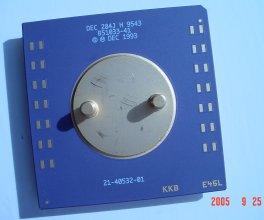 This one above is an Alpha 21064 taken from an AlphaStation 200 4/166, it's a RISC processor. Alpha's were made by Digital which was acquired by Compaq, which at its turn merged with hp. Digital is also known as DEC (Digital Equipment Corporation), they made the PDP11, maybe the most famous machine to run Unix.
This one above is an Alpha 21064 taken from an AlphaStation 200 4/166, it's a RISC processor. Alpha's were made by Digital which was acquired by Compaq, which at its turn merged with hp. Digital is also known as DEC (Digital Equipment Corporation), they made the PDP11, maybe the most famous machine to run Unix.
Several versions of Digital Unix ran on this chip: OSF/1, Ultrix and True64. I still cannot tell the relationship between all three. There's a Linux port (architecture name "alpha" or "axp") to Alpha, actually Alpha was the first non-x86 platform on which Linux ran. Red Hat and SuSE had (now discontinued) distributions for Alpha, Debian still has a maintained port.
I remember reading in Communications of the ACM a story about Robert Metcalfe who, in the 70's, got a research grant from Digital in the form of a PDP8 system. The PDP8 was relatively a medium sized machine by the time's standards. Somehow, the system got stolen from the lab and Metcalfe had to call Digital in panic expecting them to storm the place with flocks of cops, but to his astonishment, Digital visited the lab with their Public Relations staff and started an advertising campaign named: "PDP8: the first computer small enough to be stolen".
There is no doubt that Digital has always been a shrine in the eyes of computer engineers throughout the 70's and 80's representing an example of great engineering and shaping a part of the computing history.
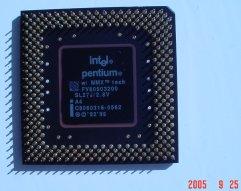 This is the Intel Pentium. Well, it was not really made to run Unix, although some of its predecessors did run some early commercial versions of Unix, namely Microsoft Xenix and SCO Unix.
This is the Intel Pentium. Well, it was not really made to run Unix, although some of its predecessors did run some early commercial versions of Unix, namely Microsoft Xenix and SCO Unix.
Curiously, modern Linux versions are spreading very well on machines with this chip. It's definitely the most widely deployed architecture of personal computing these days. Intel is moving to the 64 bit arena with the Itanium, but after some time they got it: the Itanium was too intrusive for the industry: it requires new motherboards, new BIOS and new everything. The EM64T, apparently copied from an AMD initiative, was way more acceptable and was absorbed much easier by consumers.
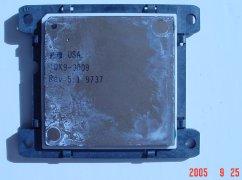 This is the hp PA-RISC, PA as in Precision Architecture. This RISC chip had some outstanding floating point performance compared to its competitors. hp-ux is probably the only Unix to run on this chip in production sites, there's a Linux port (architecture name "hppa" or "parisc") but I think only Debian are maintaining a distribution for it. The last time I saw a Linux "booting" on a PA was in 1999 when I tested the boot code on a hp 9000/715. The 9000 series are the PA-RISC based hp systems, the 800 series are servers and the 700 series are workstations, or so it seems to me. hp are apparently slowly dropping this processor and replacing it with the Itanium.
This is the hp PA-RISC, PA as in Precision Architecture. This RISC chip had some outstanding floating point performance compared to its competitors. hp-ux is probably the only Unix to run on this chip in production sites, there's a Linux port (architecture name "hppa" or "parisc") but I think only Debian are maintaining a distribution for it. The last time I saw a Linux "booting" on a PA was in 1999 when I tested the boot code on a hp 9000/715. The 9000 series are the PA-RISC based hp systems, the 800 series are servers and the 700 series are workstations, or so it seems to me. hp are apparently slowly dropping this processor and replacing it with the Itanium.
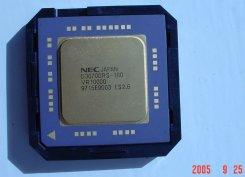 This is the MIPS R10000 taken from an SGI Origin 200. I was under the impression that SGI were the only users of this chip. It seems like it has some significant wide-spread in embedded devices, Cisco routers and hp printers run on MIPS for instance. The most popular Unix to run on this chip is the SGI Irix, there's a Linux port which doesn't seem to be very popular. I think only Debian maintains a Linux distribution.
This is the MIPS R10000 taken from an SGI Origin 200. I was under the impression that SGI were the only users of this chip. It seems like it has some significant wide-spread in embedded devices, Cisco routers and hp printers run on MIPS for instance. The most popular Unix to run on this chip is the SGI Irix, there's a Linux port which doesn't seem to be very popular. I think only Debian maintains a Linux distribution.
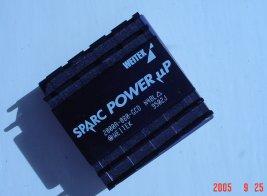
This Sun Sparc processor was taken from a SparcStation 2, Sun (the Stanford University Network) started in early 80's. They, like many other Unix vendors, started using Motorola 680x0 then started their own chip business. The nice thing about this is that Sun created an independent organisation to develop the Sparc platfrom so today you can buy a Sparc system from Fujitsu Siemens for example. The primary operating system running on these is obviously Sun Solaris (formerly SunOS), and it's still the largest deployed commercial Unix version. A Linux port (architecture name "sparc" and "sparc64") exists since the late 90's, Red Hat and SuSE had Linux distributions for Sparc but they were discontinued at versions 6.2 for Red Hat and 7.3 for SuSE. Debian still maintains a Sparc port.
I'm certainly missing some important pieces in my collection, namley: IBM PowerPC, Motorola 680x0 and Intel Itanium. I have an extra MIPS R10000 which I'm willing to exchange for a PowerPC, an ARM, an Opteron, a 680x0 or anything with historical value.
Today, I still regard "Unix the concept" as a great technological achievement, but I have a lot lower impression of the way the industry commercialised it. The latter notwithstanding, I managed to collect some of the symbols the Unix golden era: the processors made to run Unix.
 This one above is an Alpha 21064 taken from an AlphaStation 200 4/166, it's a RISC processor. Alpha's were made by Digital which was acquired by Compaq, which at its turn merged with hp. Digital is also known as DEC (Digital Equipment Corporation), they made the PDP11, maybe the most famous machine to run Unix.
This one above is an Alpha 21064 taken from an AlphaStation 200 4/166, it's a RISC processor. Alpha's were made by Digital which was acquired by Compaq, which at its turn merged with hp. Digital is also known as DEC (Digital Equipment Corporation), they made the PDP11, maybe the most famous machine to run Unix.Several versions of Digital Unix ran on this chip: OSF/1, Ultrix and True64. I still cannot tell the relationship between all three. There's a Linux port (architecture name "alpha" or "axp") to Alpha, actually Alpha was the first non-x86 platform on which Linux ran. Red Hat and SuSE had (now discontinued) distributions for Alpha, Debian still has a maintained port.
I remember reading in Communications of the ACM a story about Robert Metcalfe who, in the 70's, got a research grant from Digital in the form of a PDP8 system. The PDP8 was relatively a medium sized machine by the time's standards. Somehow, the system got stolen from the lab and Metcalfe had to call Digital in panic expecting them to storm the place with flocks of cops, but to his astonishment, Digital visited the lab with their Public Relations staff and started an advertising campaign named: "PDP8: the first computer small enough to be stolen".
There is no doubt that Digital has always been a shrine in the eyes of computer engineers throughout the 70's and 80's representing an example of great engineering and shaping a part of the computing history.
 This is the Intel Pentium. Well, it was not really made to run Unix, although some of its predecessors did run some early commercial versions of Unix, namely Microsoft Xenix and SCO Unix.
This is the Intel Pentium. Well, it was not really made to run Unix, although some of its predecessors did run some early commercial versions of Unix, namely Microsoft Xenix and SCO Unix.Curiously, modern Linux versions are spreading very well on machines with this chip. It's definitely the most widely deployed architecture of personal computing these days. Intel is moving to the 64 bit arena with the Itanium, but after some time they got it: the Itanium was too intrusive for the industry: it requires new motherboards, new BIOS and new everything. The EM64T, apparently copied from an AMD initiative, was way more acceptable and was absorbed much easier by consumers.
 This is the hp PA-RISC, PA as in Precision Architecture. This RISC chip had some outstanding floating point performance compared to its competitors. hp-ux is probably the only Unix to run on this chip in production sites, there's a Linux port (architecture name "hppa" or "parisc") but I think only Debian are maintaining a distribution for it. The last time I saw a Linux "booting" on a PA was in 1999 when I tested the boot code on a hp 9000/715. The 9000 series are the PA-RISC based hp systems, the 800 series are servers and the 700 series are workstations, or so it seems to me. hp are apparently slowly dropping this processor and replacing it with the Itanium.
This is the hp PA-RISC, PA as in Precision Architecture. This RISC chip had some outstanding floating point performance compared to its competitors. hp-ux is probably the only Unix to run on this chip in production sites, there's a Linux port (architecture name "hppa" or "parisc") but I think only Debian are maintaining a distribution for it. The last time I saw a Linux "booting" on a PA was in 1999 when I tested the boot code on a hp 9000/715. The 9000 series are the PA-RISC based hp systems, the 800 series are servers and the 700 series are workstations, or so it seems to me. hp are apparently slowly dropping this processor and replacing it with the Itanium. This is the MIPS R10000 taken from an SGI Origin 200. I was under the impression that SGI were the only users of this chip. It seems like it has some significant wide-spread in embedded devices, Cisco routers and hp printers run on MIPS for instance. The most popular Unix to run on this chip is the SGI Irix, there's a Linux port which doesn't seem to be very popular. I think only Debian maintains a Linux distribution.
This is the MIPS R10000 taken from an SGI Origin 200. I was under the impression that SGI were the only users of this chip. It seems like it has some significant wide-spread in embedded devices, Cisco routers and hp printers run on MIPS for instance. The most popular Unix to run on this chip is the SGI Irix, there's a Linux port which doesn't seem to be very popular. I think only Debian maintains a Linux distribution.
This Sun Sparc processor was taken from a SparcStation 2, Sun (the Stanford University Network) started in early 80's. They, like many other Unix vendors, started using Motorola 680x0 then started their own chip business. The nice thing about this is that Sun created an independent organisation to develop the Sparc platfrom so today you can buy a Sparc system from Fujitsu Siemens for example. The primary operating system running on these is obviously Sun Solaris (formerly SunOS), and it's still the largest deployed commercial Unix version. A Linux port (architecture name "sparc" and "sparc64") exists since the late 90's, Red Hat and SuSE had Linux distributions for Sparc but they were discontinued at versions 6.2 for Red Hat and 7.3 for SuSE. Debian still maintains a Sparc port.
I'm certainly missing some important pieces in my collection, namley: IBM PowerPC, Motorola 680x0 and Intel Itanium. I have an extra MIPS R10000 which I'm willing to exchange for a PowerPC, an ARM, an Opteron, a 680x0 or anything with historical value.


هناك 6 تعليقات:
Happy to see you blogging ;-) Very interesting and promising first post.
Houssein,
Thank you for this much needed encouragement, it's worth a lot when it comes from a veteran :)
-Imed
marhbé...bien que moi et l'angalis..on n'est pas vraiment..mais je vais m'y mettre a travers les blogs..ca va m'aider..je suis pas "veteran" ..mais je t'encourage :P
Ahlan Etta,
Tres heureux de voir ton commentaire, j'ai regarde ton Blog et c'est vraiment tres beau a lire, يعطيك الصحة. Ca me reppelle mon retour (presume definitif :) en Tunisie il y a 3 ans. Je dois peut-etre poster un article sur le sujet moi aussi..
Encore merci pour les encouragements,
-Imed
Hi .
i was searching the word Cisco in Google and suddendly i crossed your site .
Very intersting what you have done .What 's your rapport with Cisco?
Salam
Ahlan Saber,
I think that the search engine that returned my pages as pertaining to Cisco will need some serious rework :)
I dealt with some Cisco GSRs back in Sprint Labs and my office in Dubai Internet City was about 50m away from the Cisco Systems building. That's all I know about Cisco :)
-Imed
إرسال تعليق